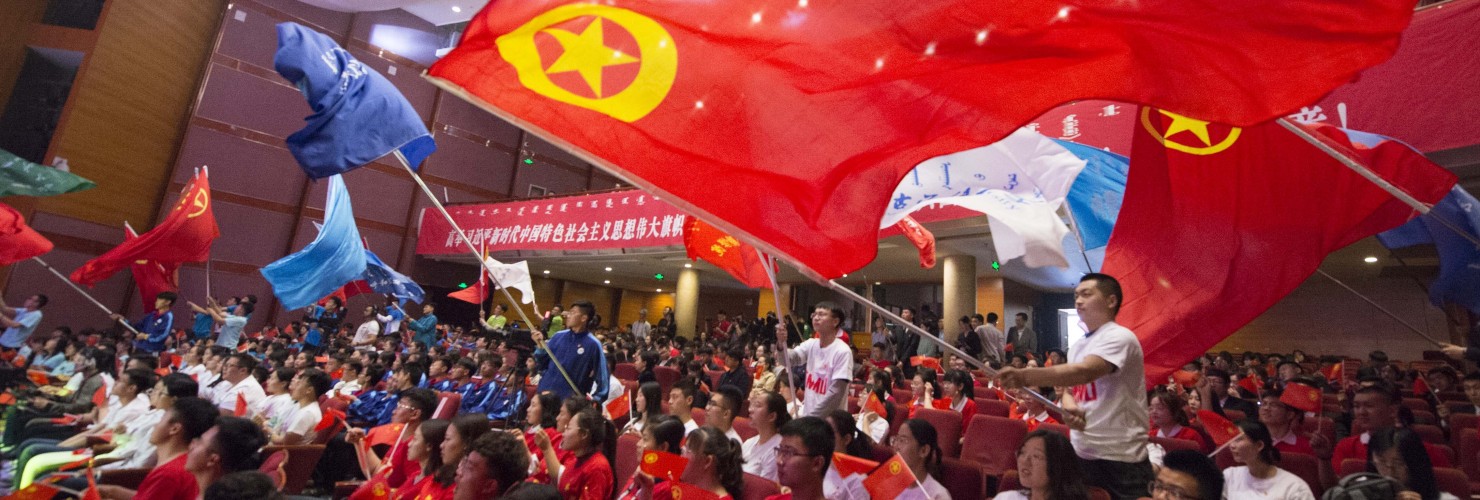

China's Communist Youth League: Eternally young at a hundred
China’s Communist Youth League is huge, but not a force distinct from the Communist Party. MERICS Senior Fellow Charles Parton says Xi sees it as crucial for winning the hearts and minds of the young.
The Chinese Communist Party (CCP) is a jealous god: it dislikes and disallows other organizations. Yet one organization in China is twice its size, the Communist Youth League (CYL). Its members are aged between 14 and 28 and now number 73.7 million. Add 130 million five- to 14-year-old Young Pioneers, and the CYL and its feeder organization may have double the 95 million members the CCP boasts (although some CYL members are also in the CCP). The CCP has just celebrated the CYL’s 100th anniversary and CCP General Secretary Xi Jinping made “an important speech” about what is an important organization.
Of course, juxtaposing the CYL to the CCP is a nonsense – the CCP controls the CYL. But it is a nonsense which many western commentators echo when they portray the CYL as an independent power base or faction within the party, at odds with the “princelings” and the “Shanghai gang”. Power in China is about the strongman, less about factions or organizations. When he was CCP General Secretary, Hu Jintao promoted colleagues whom he knew and trusted. Some he had worked with in his three years as head of the CYL, others in Guizhou or Tibet, or when he joined the Politburo. (The same is true of Xi and will likely be true of his successor.)
We should put aside thoughts of the CYL as an ideological or factional base
So, it is eccentric to ascribe Hu’s power base to the three years, from 1982 to 1985, which he spent in leading positions at CYL. That so many of his adherents had a CYL background is hardly surprising, given that it is an important party organization and was used as a proving ground for young cadres with high prospects. Some with CYL backgrounds are red aristocracy, the so- called princelings mentioned above. We should put aside thoughts of the CYL as an ideological or factional base (and similarly the “Shanghai gang” and “princelings”).
Rather, we should think of “Hu-ists”, “Jiang-ists” and “Xi-ists”. And below them, of other “-ists”, people who have ridden up on the coat tails of, say, Li Keqiang, Wang Yang, or of other Politburo Standing Committee grandees, Politburo members or provincial party secretaries – and so on downwards through the levels of the party. And currently, everyone is a “Xi-ist”, even if just outwardly – over a decade ago, top party leaders agreed on promoting Xi because they thought that corruption, lax ideology and reduced control threatened the CCP, just as they had threatened the Soviet Communist Party.
Once in power, a new General Secretary must consolidate power over party organs. The People's Liberation Army and the security services are crucial. But other important areas include propaganda, the United Front and the CYL. Moreover, Xi always pushed for stronger central controls, political homogeneity, no individual fiefdoms. Many future leaders of the CCP will pass through the CYL, so it is important for the General Secretary to control the organization and the passage through it of those who will eventually become leaders.
Xi had long been unhappy with the CYL’s fulfilment of its role
Xi had long been unhappy with the CYL’s fulfilment of its role, as he revealed in a 2017 book: the CYL was full of empty slogans, bureaucracy and arrogance, its grass-roots organizations “not of any use and exist[ing] only in name”. In 2016, the Central Committee issued a "Reform Plan for the Central Committee of the Communist Youth League", which noted that Xi had given “important instructions on the work of youth” and the CYL. This aimed to combat the self-serving nature of the CYL leadership, to re-energize and modernize (e.g., online) its basic work of ensuring that the CYL acted to “serve young people”, or less euphemistically, ensure that they promoted party aims.
Xi’s May 10 speech to mark the 100th anniversary of the CYL was not a policy document. It was celebration rather than prescription. Still, he laid out the role of the CYL as:
- Inculcating ideology and educating the young for/in support of the party, “a school for young people to learn socialism and communism with Chinese characteristics”
- “Uniting and leading young members of the Youth League to consciously obey the call of the party”
- Being a bridge between party and youth, between the Young Pioneers and the party (described respectively as vanguard, shock brigade, and reserve force), a "trilogy of life" for young people to pursue political progress
- “Being courageous in self-revolution, and always becoming an advanced organization that closely follows the party”
These aims reflect Xi’s fixation on “forging the soul” of the young, an unabashed sinicizing of Stalin’s “engineering the soul”. In the last decade, Xi has overseen the strengthening of political indoctrination from primary schools to universities. He has long emphasized the need for the young from Taiwan and Hong Kong to visit and understand China – and now there is more direct interference in Hong Kong’s education system. In 2017, the Central Committee issued its first youth development plan, with emphasis on projects for training in Marxism and in core socialist values. This year, the State Council Information Office published a white paper, "Youth of China in the New Era".
The CCP is keen to ensure the young do not behave as the Red Guards in the Cultural Revolution or act as a catalyst of insurrection like the students of 1989. But it is about far more than control. The souls of the young must be engineered because Xi is a true believer in the necessity, utility and correctness of Marxism; they must be imbued with the correct political outlook, because “Young Chinese are always in the vanguard of the drive to rejuvenate the nation”. Or, to translate this party-speak, the next generation must continue to keep the CCP in power. Otherwise, the China Dream will turn into a nightmare for today’s generation of leaders.
The CCP is a jealous god, and it fears for its immortality.
